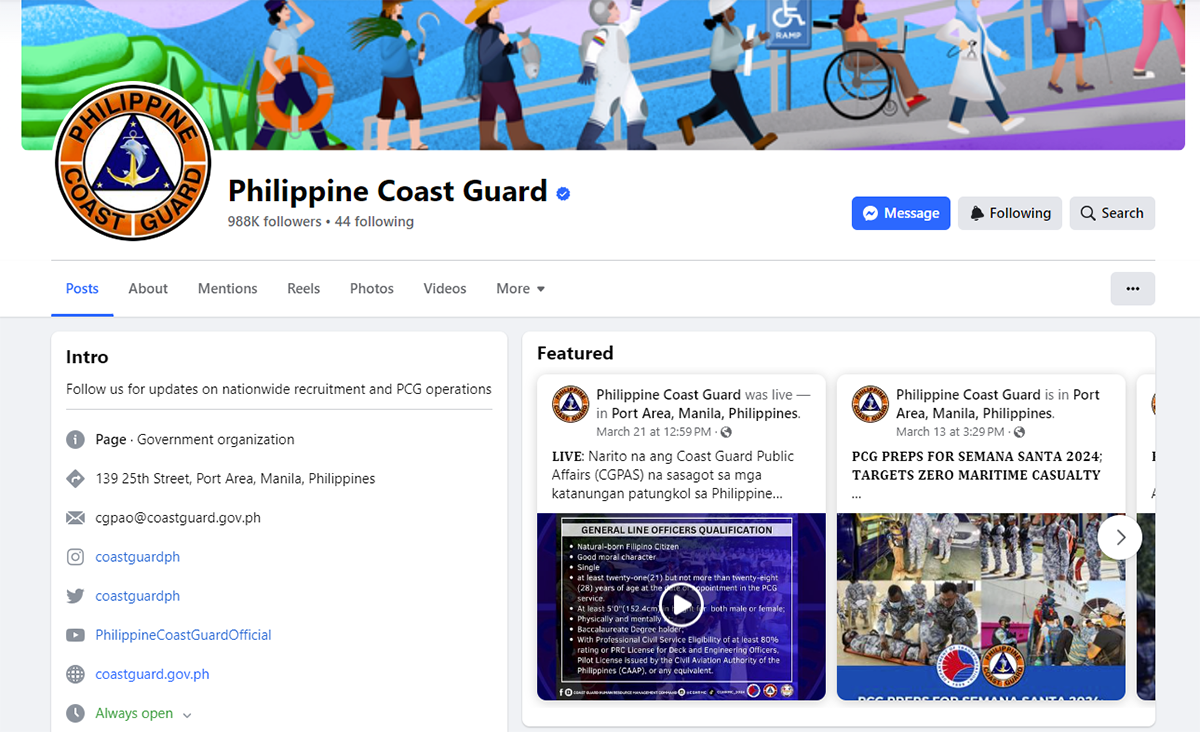The Recent Cyberattack on the Philippine Coast Guard’s Facebook Page
The recent cyberattack on the official Facebook page of the Philippine Coast Guard (PCG) has raised concerns about the security measures in place to protect government websites and social media accounts. The recurrence of such incidents indicates a vulnerability that needs to be addressed urgently. The PCG’s Facebook account has become a target for hackers, with this being the third time in just a few weeks that it has been compromised.
Immediate Action and the Need for Stronger Cybersecurity Measures
The PCG is not taking this lightly and has taken immediate action by removing the accounts that had control over the Facebook page. However, this incident highlights the need for stronger cybersecurity measures to prevent future attacks. The PCG’s Public Affairs team is working closely with the Cybercrime Investigation and Coordinating Center (CICC) to investigate the breach and assess the extent of the security breach.
The Importance of Robust Cybersecurity Protocols
It has been determined that the attackers used malware software to gain access to the PCG’s Facebook page and post the malicious videos. This emphasizes the importance of having robust cybersecurity protocols in place to detect and prevent such attacks. The CICC is conducting back-end operations to identify the perpetrators and ensure that appropriate legal action is taken against them.
Concerns about Overall Cybersecurity Infrastructure
This cyberattack is not an isolated incident for the PCG. In the past, their official Twitter page was also hacked, albeit temporarily. The fact that multiple government websites, including the PCG’s website, have been targeted by cyberattacks originating from a specific location in China further raises concerns about the overall cybersecurity infrastructure in place.
The Role of the Department of Information and Communications Technology (DITC)
The Department of Information and Communications Technology (DITC) has previously reported on these cyberattacks and has been working to enhance the security measures across government websites. However, this recent incident calls for a more comprehensive approach to cybersecurity. It is crucial for the government to invest in advanced technologies and expertise to protect its digital assets from malicious actors.
The Need for a Comprehensive Approach to Cybersecurity
In conclusion, the cyberattack on the Philippine Coast Guard’s Facebook page is a wake-up call for the government to prioritize cybersecurity. The recurrence of such incidents highlights the need for stronger measures to safeguard government websites and social media accounts. It is essential to invest in advanced technologies and collaborate with cybersecurity experts to ensure the protection of sensitive information and maintain the trust of the public.
The Growing Threat of Cyberattacks
One of the reasons why cyberattacks are becoming more prevalent is the rapid advancement of technology. As technology continues to evolve, so do the methods and techniques used by cybercriminals. They are constantly finding new vulnerabilities to exploit and developing sophisticated tools to carry out their attacks. This means that organizations and individuals need to constantly update their cybersecurity measures to stay one step ahead of these threats.
The Increasing Reliance on Digital Systems and the Internet
Another factor contributing to the growing threat of cyberattacks is the increasing reliance on digital systems and the internet. With the rise of cloud computing, IoT devices, and remote work, more and more sensitive data is being stored and transmitted electronically. This creates a larger attack surface for cybercriminals to target. Additionally, the COVID-19 pandemic has accelerated the digital transformation of many industries, further expanding the opportunities for cyberattacks.
The Interconnected Nature of the Global Economy
Furthermore, the interconnected nature of the global economy means that cyberattacks can have ripple effects across industries and countries. A successful attack on one organization can lead to a chain reaction of disruptions and financial losses for its partners and stakeholders. This interconnectedness also means that cybercriminals can operate from anywhere in the world, making it difficult to track and prosecute them.
A Proactive Approach to Cybersecurity
To combat the growing threat of cyberattacks, organizations and individuals need to adopt a proactive approach to cybersecurity. This includes implementing robust security measures such as firewalls, encryption, multi-factor authentication, and regular system updates. It also involves educating employees and individuals about the importance of cybersecurity and promoting safe online practices.
Source: The Manila Times








